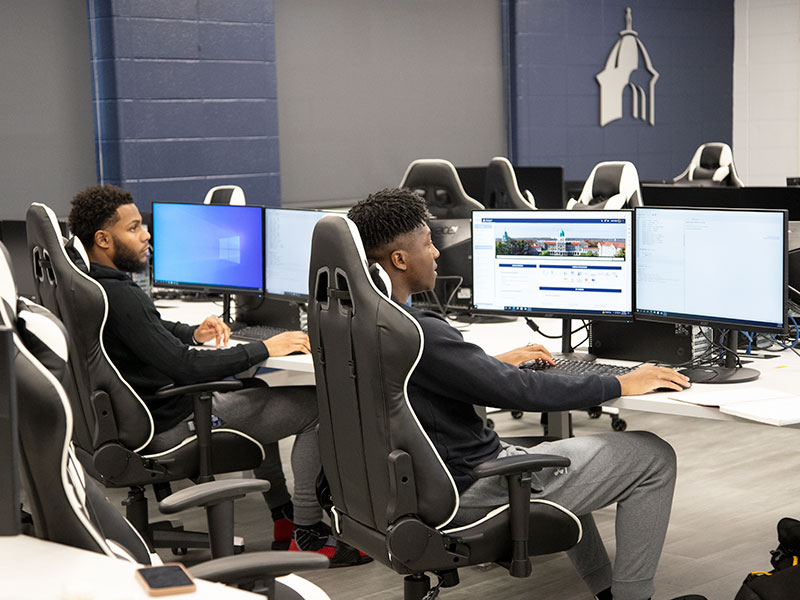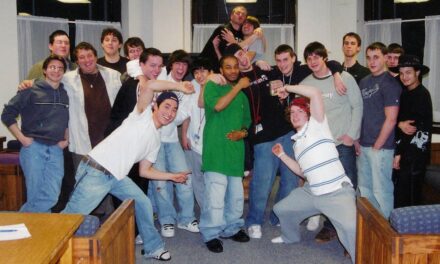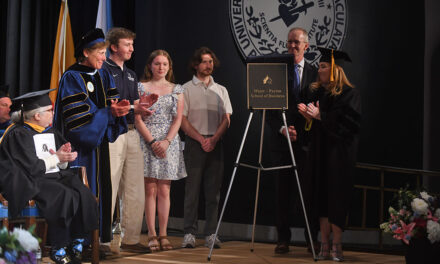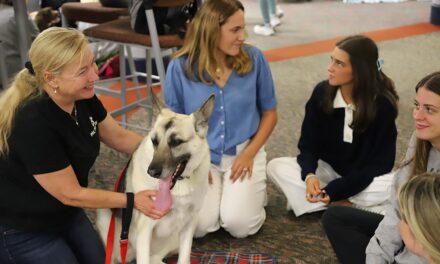From business and cybersecurity to social media, software development and classroom instruction, Immaculata University is reshaping how students prepare for the working world. With new programs and in-demand concentrations, the University is building curricula aligned with emerging technologies — especially artificial intelligence — and addressing evolving industry needs in health care, education and business. Below are examples of how Immaculata is innovating to meet today’s workforce demands.
Business innovation: Market-driven MBA concentrations
Immaculata’s online Master of Business Administration recently added four concentrations designed to meet the growing demand for skilled leaders: artificial intelligence, cybersecurity, business analytics and human resources. The AI, cybersecurity and business analytics concentrations were developed with Rize Education and are offered asynchronously, providing flexibility for working professionals. Immaculata’s MBA remains one of the more affordable options in the region. The rest of the MBA program includes a mix of online synchronous and asynchronous coursework.
“The new tracks provide students with the ability to compete in today’s workplace. Courses focus on contemporary issues, helping graduates address organizational challenges as technology and AI evolve rapidly,” said Sarah Dougherty, MBA program director.
The AI concentration emphasizes a business-oriented, low-code approach. The cybersecurity concentration prepares students to manage digital threats, while business analytics focuses on turning data into actionable insights. The human resources concentration, developed and delivered by Immaculata faculty, trains students in data-driven talent management.
“Our courses go beyond facts and numbers, preparing students for leadership and service while encouraging, innovative, critical thinking, ethics in business practices and community building… equipping graduates to thrive in any organization,” Dougherty said. “Employers seek graduates with both technical knowledge and durable skills. Our MBA is designed with both in mind.”

Coding the future: Applied computer science that solves real problems
Immaculata’s new applied computer science major prepares undergraduate students for today’s tech landscape, focusing on software design, web development and data problem-solving.
Students learn scalable coding, full-stack web development, software-hardware interaction, documentation, testing, ethical reasoning and communication — skills essential for technical roles and leadership. Pairing the major with minors in psychology, business or health care allows tailored IT solutions across sectors.
Graduates gain not only technical proficiency but also ethical innovation skills to thrive in evolving tech environments.
Educating the educators: Preparing future teachers for the AI-enhanced classroom
Immaculata will be among the first universities to adopt Magic School — an AI-powered education platform — into its undergraduate education programs, preparing future teachers to integrate AI tools effectively.
“We want students to use this tool during their preparation, so they enter classrooms ahead of their peers,” said Chair of the Division of Education Melissa Reed, Ed.D.
In courses like Differentiated Instruction, one of the courses taught by Kelly Doyle, Ed.D., associate professor and director of the undergraduate education programs, students learn to design personalized lessons using Magic School. Doyle said this hands-on experience strengthens résumés and meets real demands as schools adopt AI.
Karen Miscavage, Ed.D., associate professor and director of the master’s education programs who teaches courses such as foundations of education and learning, curriculum application, introduction to special education and adapting instruction, said these experiences are in line with best practices, helping students apply AI learning before graduation. By bridging cutting-edge technology with practical classroom experience, Immaculata University is ensuring future educators are not just prepared to teach—but prepared to lead in their classrooms.
Digital storytelling for every industry: The Social Media Digital Creator minor
Immaculata University’s commitment to preparing students for today’s evolving professional landscape extends well beyond traditional tech and business fields. With the launch of its new Social Media Digital Creator minor, the University is addressing the growing demand for skilled communicators who can navigate a media-saturated, digitally driven world.
The minor develops skills in branding, storytelling, strategy and ethics. Designed for a range of fields—from journalism, business to health care—it prepares students to communicate, influence and inform effectively.
“This minor strengthens skills in digital storytelling, audience engagement, crisis communication and AI/VR content creation,” said Melissa Rice, Ph.D., assistant professor of communication.
By combining creativity with analytics, hands-on production and a strong foundation in ethics, the Social Media Digital Creator minor reflects the realities of the digital age. Students not only learn how to create content—but also how to think critically about the role it plays in society and the impact it can have across industries.
Preparing the next generation of counseling educators and leaders
Immaculata’s new Ph.D. in Counselor Education and Supervision supports experienced counseling professionals pursuing advanced roles as educators, leaders and advocates. Designed for those with master’s degrees, the program creates cohorts rich in real-world experience.
“The mental health field is growing, and we’re training Ph.D. candidates to become faculty, supervisors and advocates for the next generation of counselors,” said David Martinson, Ph.D., chair of the psychology and counseling department.
This unique regional offering fills a gap in advanced counselor education. Kane Britton, a student in the inaugural cohort, said it strengthens the skills he needs for career advancement as a counselor and future educator.
Program director Ryan Bowers, Ph.D. helped design the curriculum after recognizing limited local options. The rigorous three-year degree blends theory and practice with instruction in counseling pedagogy, clinical supervision, research and advocacy.
Graduates are prepared to teach, supervise licensure candidates, conduct research and advocate for clients and the profession.
Paige Lilly-Ives, a clinical supervisor and doctoral student, praised the faculty’s expertise and the program’s impact on her clinical and supervisory skills, “I’ve come to realize how much the educator shapes the learning experience,” she said.
The Ph.D. in Counselor Education and Supervision isn’t just a new academic offering—it’s a strategic response to the needs of counseling professionals in the region and a meaningful investment in the future of the field.
Degrees that drive innovation with ethics and impact
Immaculata’s programs are a commitment to innovation grounded in ethical leadership and real-world impact. By weaving together technology, interdisciplinary collaboration and a deep understanding of workforce needs—especially in health care, education, communications and business—the University is equipping its students not just to adapt to change, but to lead it.
From AI-powered classrooms and social media entrepreneurship to one-of-a-kind counseling education, Immaculata is shaping graduates who don’t just keep pace with the future—they help create it. Prepared to tackle today’s most pressing challenges and develop meaningful solutions, students emerge as thoughtful innovators ready to make a lasting impact in their communities and industries for years to come.






